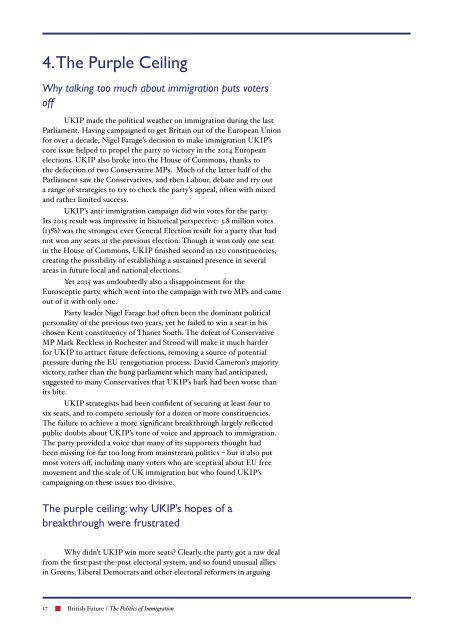THE POLITICS OF IMMIGRATION
The-politics-of-immigration
The-politics-of-immigration
You also want an ePaper? Increase the reach of your titles
YUMPU automatically turns print PDFs into web optimized ePapers that Google loves.
4. The Purple Ceiling<br />
Why talking too much about immigration puts voters<br />
off<br />
UKIP made the political weather on immigration during the last<br />
Parliament. Having campaigned to get Britain out of the European Union<br />
for over a decade, Nigel Farage’s decision to make immigration UKIP’s<br />
core issue helped to propel the party to victory in the 2014 European<br />
elections. UKIP also broke into the House of Commons, thanks to<br />
the defection of two Conservative MPs. Much of the latter half of the<br />
Parliament saw the Conservatives, and then Labour, debate and try out<br />
a range of strategies to try to check the party’s appeal, often with mixed<br />
and rather limited success.<br />
UKIP’s anti-immigration campaign did win votes for the party.<br />
Its 2015 result was impressive in historical perspective: 3.8 million votes<br />
(13%) was the strongest ever General Election result for a party that had<br />
not won any seats at the previous election. Though it won only one seat<br />
in the House of Commons, UKIP finished second in 120 constituencies,<br />
creating the possibility of establishing a sustained presence in several<br />
areas in future local and national elections.<br />
Yet 2015 was undoubtedly also a disappointment for the<br />
Eurosceptic party, which went into the campaign with two MPs and came<br />
out of it with only one.<br />
Party leader Nigel Farage had often been the dominant political<br />
personality of the previous two years, yet he failed to win a seat in his<br />
chosen Kent constituency of Thanet South. The defeat of Conservative<br />
MP Mark Reckless in Rochester and Strood will make it much harder<br />
for UKIP to attract future defections, removing a source of potential<br />
pressure during the EU renegotiation process. David Cameron’s majority<br />
victory, rather than the hung parliament which many had anticipated,<br />
suggested to many Conservatives that UKIP’s bark had been worse than<br />
its bite.<br />
UKIP strategists had been confident of securing at least four to<br />
six seats, and to compete seriously for a dozen or more constituencies.<br />
The failure to achieve a more significant breakthrough largely reflected<br />
public doubts about UKIP’s tone of voice and approach to immigration.<br />
The party provided a voice that many of its supporters thought had<br />
been missing for far too long from mainstream politics – but it also put<br />
most voters off, including many voters who are sceptical about EU free<br />
movement and the scale of UK immigration but who found UKIP’s<br />
campaigning on these issues too divisive.<br />
The purple ceiling: why UKIP’s hopes of a<br />
breakthrough were frustrated<br />
Why didn’t UKIP win more seats? Clearly, the party got a raw deal<br />
from the first-past-the-post electoral system, and so found unusual allies<br />
in Greens, Liberal Democrats and other electoral reformers in arguing<br />
17 British Future / The Politics of Immigration


